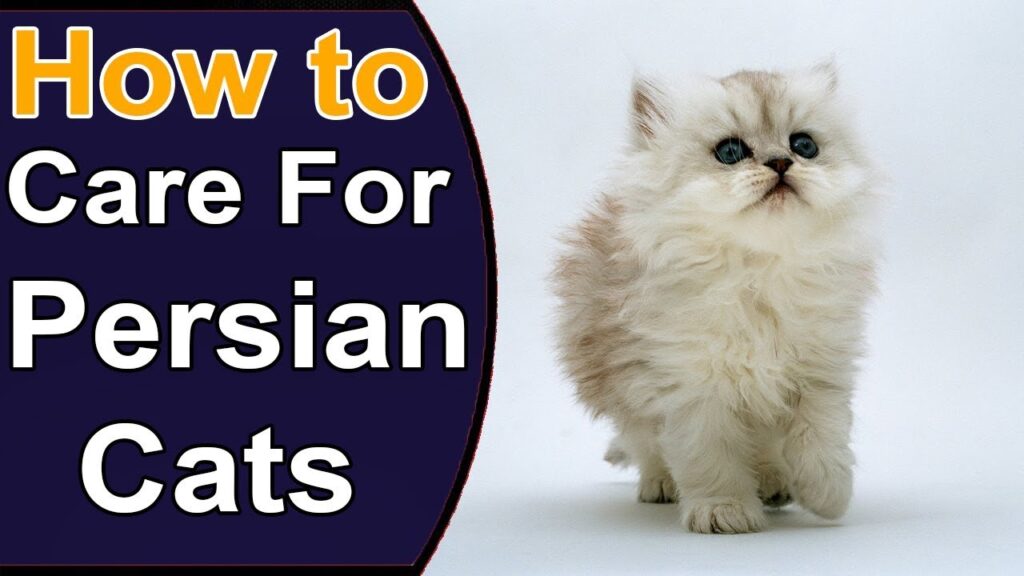Do you own a Persian cat or are you thinking about getting one? Let’s talk about Persian cat health and care tips! Taking care of a Persian cat is no easy task, but with the right knowledge and tips, you can ensure that your furry friend stays happy and healthy. In this article, we will discuss everything you need to know about Persian cat health and care, from their grooming needs to their dietary requirements. So, stay tuned and get ready to learn more about keeping your Persian cat in tip-top shape!
When it comes to taking care of a Persian cat, there are a few key areas that you need to focus on. First and foremost, grooming is crucial for these long-haired beauties. Persians have a thick, luxurious coat that requires regular brushing to prevent matting and tangling. Additionally, their eyes need special care as they are prone to tear stains. We will delve into grooming techniques and tips to keep your Persian cat looking their best. Next, we will talk about their dietary needs and the best types of food for a healthy Persian cat. Persian cats have a sensitive digestive system, so it’s important to choose the right kind of food for them. We will discuss the importance of a balanced diet and provide suggestions on the best cat foods for Persians. Stay tuned for more detailed information on these topics and much more in our upcoming posts on Persian cat health and care!
Persian Cat Health and Care Tips
Having a Persian cat as a pet can be a wonderful experience. Their luxurious coats, striking looks, and gentle temperament make them one of the most popular cat breeds in the world. However, like any other pet, Persian cats require proper care and attention to ensure their health and well-being. In this article, we will explore some essential Persian cat health and care tips that every owner should know.

1. Understanding the Breed Characteristics
Before bringing home a Persian cat, it’s important to understand the breed characteristics. Persian cats are known for their long, thick coats, flat faces, and round bodies. They have a calm and gentle nature, making them ideal indoor companions. However, their long coats require regular grooming to prevent matting and keep their fur healthy and beautiful.
2. Creating a Safe Environment for Your Persian Cat
Creating a safe environment is crucial for the well-being of your Persian cat. Make sure your home is cat-proofed by removing any toxic plants, chemicals, or small objects that could be harmful if ingested. Provide your cat with a comfortable and quiet space where they can relax and retreat whenever they want. Consider investing in cat-friendly furniture and scratching posts to keep your Persian cat entertained and prevent them from damaging your belongings.

3. Feeding and Nutrition for Persian Cats
Proper nutrition plays a vital role in maintaining the health of your Persian cat. Feed them a balanced diet that is specifically formulated for their breed and age. Persian cats have a tendency to develop urinary tract problems, so it’s important to provide them with a diet that promotes urinary health. Consult your veterinarian to determine the best diet plan for your Persian cat.
4. Grooming and Coat Care
Grooming is an essential part of Persian cat care. Their long, luxurious coats require regular brushing to prevent matting and tangling. Invest in a high-quality brush or comb specifically designed for long-haired cats. Brush your Persian cat’s coat at least once a day to remove loose hair and prevent hairballs. Additionally, consider scheduling professional grooming sessions every few months to keep their coats in optimal condition.

5. Maintaining a Healthy Weight
Maintaining a healthy weight is crucial for the overall health and well-being of your Persian cat. These cats have a tendency to gain weight easily, so it’s important to monitor their diet and provide regular exercise. Engage your Persian cat in interactive play sessions to keep them active and help them burn calories. Avoid overfeeding and opt for portion-controlled meals to prevent obesity.
6. Common Health Issues in Persian Cats
While Persian cats are generally healthy, they are prone to certain health issues. Some common health issues in Persian cats include:
- Polycystic Kidney Disease (PKD): This genetic condition causes the formation of cysts in the kidneys.
- Eye Problems: Persians are prone to eye conditions such as eye discharge, tear duct blockage, and entropion (inward rolling of eyelids).
- Respiratory Problems: Their flat faces can lead to respiratory difficulties, such as snoring and wheezing.
- Dental Issues: Persian cats are more susceptible to dental problems, including gum disease and tooth decay.
It’s important to be aware of these potential health issues and schedule regular veterinary check-ups to monitor your Persian cat’s health.

7. Regular Veterinary Check-ups
Regular veterinary check-ups are essential for maintaining your Persian cat’s health. Schedule routine visits with a trusted veterinarian to ensure that your cat is up to date on vaccinations and receive preventive care. Your vet will also conduct a thorough physical examination and check for any potential health concerns. Early detection can greatly improve the chances of successful treatment and a longer, happier life for your Persian cat.
8. Vaccinations and Preventive Care
Vaccinations are an important aspect of Persian cat care. Make sure your cat receives all necessary vaccinations as recommended by your veterinarian. Vaccinations protect them against common infectious diseases such as feline distemper, feline herpesvirus, and rabies. Additionally, consult your vet about preventive care measures such as flea and tick control, heartworm prevention, and regular deworming.

9. Dental Care for Persian Cats
Dental care is often overlooked but plays a crucial role in maintaining your Persian cat’s overall health. Like humans, cats can develop dental problems, including gum disease, plaque buildup, and tooth decay. Establish a regular dental care routine for your Persian cat, which includes brushing their teeth regularly with a cat-specific toothpaste and providing dental treats or toys to promote oral hygiene.
10. Exercise and Mental Stimulation
Regular exercise and mental stimulation are essential for keeping your Persian cat happy and healthy. Engage in interactive play sessions with your cat using toys such as feather wands or laser pointers. Provide scratching posts, climbing trees, and puzzle toys to keep them mentally stimulated. Encourage your Persian cat to play and explore their environment to prevent boredom and promote a healthy lifestyle.
11. Recognizing and Managing Stress
Persian cats are sensitive creatures and can easily become stressed in certain situations. Changes in environment, loud noises, or unfamiliar visitors can cause stress and anxiety in your cat. Learn to recognize the signs of stress, such as excessive grooming, hiding, or aggression. Create a calm and soothing environment for your Persian cat and provide them with a safe space to retreat to when they feel overwhelmed.
12. Training and Behavior Tips
Training your Persian cat can help establish boundaries, prevent unwanted behaviors, and strengthen the bond between you and your pet. Use positive reinforcement techniques such as treats and praises to reward good behavior. Be patient and consistent in your training efforts, and never resort to punishment or negative reinforcement. Consult with a professional cat trainer if you need assistance in training your Persian cat.
13. Dealing with Allergies and Allergens
Persian cats are known to produce fewer allergens than other cat breeds, making them suitable for people with allergies. However, it’s still possible for some individuals to be allergic to Persian cats. If you or a family member have allergies, consider spending time with a Persian cat before bringing one home to ensure that you don’t have an allergic reaction. Regular grooming and keeping the house clean can also help reduce allergens.
14. Conclusion
Caring for a Persian cat requires time, effort, and dedication. By following these Persian cat health and care tips, you can ensure that your furry friend leads a happy and healthy life. Remember to provide a safe environment, maintain a balanced diet, schedule regular veterinary check-ups, and engage in play and mental stimulation. With proper care and attention, your Persian cat will be a beloved companion for many years to come.
Frequently Asked Questions:
Q1: How often should I groom my Persian cat?
A1: It’s recommended to brush your Persian cat’s coat at least once a day to prevent matting and keep their fur healthy. Additionally, consider professional grooming sessions every few months.
Q2: What should I feed my Persian cat?
A2: Feed your Persian cat a balanced diet that is specifically formulated for their breed and age. Consult your veterinarian to determine the best diet plan, taking into consideration their nutritional needs and any specific health concerns.
Q3: Are Persian cats prone to any health issues?
A3: Yes, Persian cats are prone to certain health issues such as polycystic kidney disease (PKD), eye problems, respiratory difficulties, and dental issues. Regular veterinary check-ups are important to monitor their health.
Q4: How can I prevent obesity in my Persian cat?
A4: To prevent obesity, monitor your Persian cat’s diet and provide portion-controlled meals. Engage them in regular exercise and play sessions to help them burn calories and maintain a healthy weight.
Q5: How can I keep my Persian cat’s teeth healthy?
A5: Establish a regular dental care routine for your Persian cat, including brushing their teeth with a cat-specific toothpaste. Providing dental treats or toys can also help promote oral hygiene.
Q6: How can I keep my Persian cat mentally stimulated?
A6: Provide your Persian cat with scratching posts, climbing trees, and puzzle toys to keep them mentally stimulated. Engage in interactive play sessions using toys and encourage exploration of their environment.
Q7: Can Persian cats cause allergies?
A7: Persian cats are known to produce fewer allergens than other cat breeds, but some individuals may still be allergic to them. Spend time with a Persian cat before bringing one home if you or a family member have allergies.
Q8: How can I recognize if my Persian cat is stressed?
A8: Signs of stress in Persian cats include excessive grooming, hiding, aggression, or changes in appetite or behavior. Create a calm and soothing environment to help alleviate stress.
Q9: Can Persian cats be trained?
A9: Yes, Persian cats can be trained using positive reinforcement techniques. Establish boundaries, reward good behavior with treats and praises, and be patient and consistent in your training efforts.
Q10: How can I reduce allergens in my home if I have a Persian cat?
A10: Regular grooming, including brushing their coat and keeping the house clean, can help reduce allergens. Consider using air purifiers and keeping the cat’s living area separate from allergy-sensitive areas.
